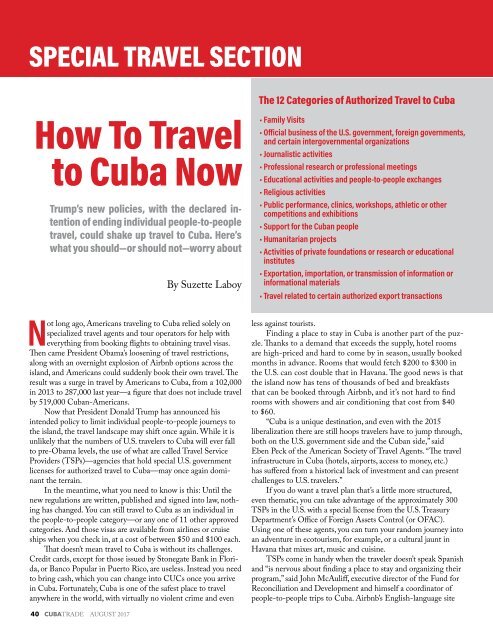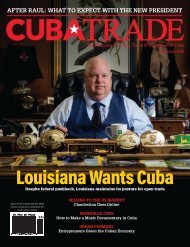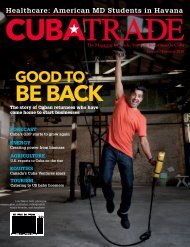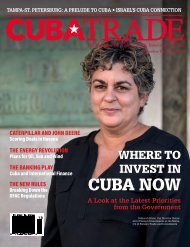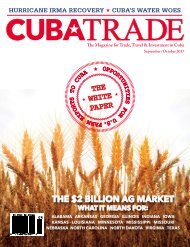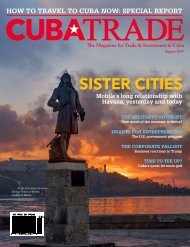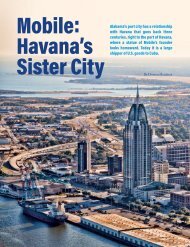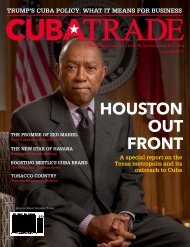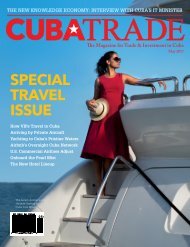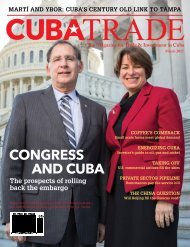You also want an ePaper? Increase the reach of your titles
YUMPU automatically turns print PDFs into web optimized ePapers that Google loves.
SPECIAL TRAVEL SECTION<br />
Educational<br />
¨<br />
Historic<br />
G<br />
Adventure<br />
P<br />
Ecotourism<br />
M<br />
Music<br />
Custom VIP<br />
Corporate<br />
Maritime<br />
Cuisine<br />
The 12 Categories of Authorized Travel to <strong>Cuba</strong><br />
How To Travel<br />
to <strong>Cuba</strong> Now<br />
Trump’s new policies, with the declared intention<br />
of ending individual people-to-people<br />
travel, could shake up travel to <strong>Cuba</strong>. Here’s<br />
what you should—or should not—worry about<br />
By Suzette Laboy<br />
• Family Visits<br />
• Official business of the U.S. government, foreign governments,<br />
and certain intergovernmental organizations<br />
• Journalistic activities<br />
• Professional research or professional meetings<br />
• Educational activities and people-to-people exchanges<br />
• Religious activities<br />
• Public performance, clinics, workshops, athletic or other<br />
competitions and exhibitions<br />
• Support for the <strong>Cuba</strong>n people<br />
• Humanitarian projects<br />
• Activities of private foundations or research or educational<br />
institutes<br />
• Exportation, importation, or transmission of information or<br />
informational materials<br />
• Travel related to certain authorized export transactions<br />
Not long ago, Americans traveling to <strong>Cuba</strong> relied solely on<br />
specialized travel agents and tour operators for help with<br />
everything from booking flights to obtaining travel visas.<br />
Then came President Obama’s loosening of travel restrictions,<br />
along with an overnight explosion of Airbnb options across the<br />
island, and Americans could suddenly book their own travel. The<br />
result was a surge in travel by Americans to <strong>Cuba</strong>, from a 102,000<br />
in 2013 to 287,000 last year—a figure that does not include travel<br />
by 519,000 <strong>Cuba</strong>n-Americans.<br />
Now that President Donald Trump has announced his<br />
intended policy to limit individual people-to-people journeys to<br />
the island, the travel landscape may shift once again. While it is<br />
unlikely that the numbers of U.S. travelers to <strong>Cuba</strong> will ever fall<br />
to pre-Obama levels, the use of what are called Travel Service<br />
Providers (TSPs)—agencies that hold special U.S. government<br />
licenses for authorized travel to <strong>Cuba</strong>—may once again dominant<br />
the terrain.<br />
In the meantime, what you need to know is this: Until the<br />
new regulations are written, published and signed into law, nothing<br />
has changed. You can still travel to <strong>Cuba</strong> as an individual in<br />
the people-to-people category—or any one of 11 other approved<br />
categories. And those visas are available from airlines or cruise<br />
ships when you check in, at a cost of between $50 and $100 each.<br />
That doesn’t mean travel to <strong>Cuba</strong> is without its challenges.<br />
Credit cards, except for those issued by Stonegate Bank in Florida,<br />
or Banco Popular in Puerto Rico, are useless. Instead you need<br />
to bring cash, which you can change into CUCs once you arrive<br />
in <strong>Cuba</strong>. Fortunately, <strong>Cuba</strong> is one of the safest place to travel<br />
anywhere in the world, with virtually no violent crime and even<br />
less against tourists.<br />
Finding a place to stay in <strong>Cuba</strong> is another part of the puzzle.<br />
Thanks to a demand that exceeds the supply, hotel rooms<br />
are high-priced and hard to come by in season, usually booked<br />
months in advance. Rooms that would fetch $200 to $300 in<br />
the U.S. can cost double that in Havana. The good news is that<br />
the island now has tens of thousands of bed and breakfasts<br />
that can be booked through Airbnb, and it’s not hard to find<br />
rooms with showers and air conditioning that cost from $40<br />
to $60.<br />
“<strong>Cuba</strong> is a unique destination, and even with the 2015<br />
liberalization there are still hoops travelers have to jump through,<br />
both on the U.S. government side and the <strong>Cuba</strong>n side,” said<br />
Eben Peck of the American Society of Travel Agents. “The travel<br />
infrastructure in <strong>Cuba</strong> (hotels, airports, access to money, etc.)<br />
has suffered from a historical lack of investment and can present<br />
challenges to U.S. travelers.”<br />
If you do want a travel plan that’s a little more structured,<br />
even thematic, you can take advantage of the approximately 300<br />
TSPs in the U.S. with a special license from the U.S. Treasury<br />
Department’s Office of Foreign Assets Control (or OFAC).<br />
Using one of these agents, you can turn your random journey into<br />
an adventure in ecotourism, for example, or a cultural jaunt in<br />
Havana that mixes art, music and cuisine.<br />
TSPs come in handy when the traveler doesn’t speak Spanish<br />
and “is nervous about finding a place to stay and organizing their<br />
program,” said John McAuliff, executive director of the Fund for<br />
Reconciliation and Development and himself a coordinator of<br />
people-to-people trips to <strong>Cuba</strong>. Airbnb’s English-language site<br />
may help fill that void, he said, though many travelers still prefer<br />
to stay in hotels and many online sites may not be as effective in<br />
<strong>Cuba</strong> is a unique destination, and<br />
even with the 2015 liberalization there<br />
are still hoops travelers have to jump<br />
through, both on the government side<br />
and the <strong>Cuba</strong>n side.”<br />
Eben Peck, American Society of Travel Agents<br />
terms of price and availability.<br />
Typically, these TSP agents use a tour guide on the <strong>Cuba</strong><br />
side provided by the government tourism ministry. Sometimes<br />
the TSPs will have their own representatives on the island as<br />
well, and travelers can turn to independent tour guides who have<br />
“found a niche,” though this is a grey area, since they are not<br />
registered with the government.<br />
The other big caveat is that tourist travel, per se, remains<br />
banned under the U.S. embargo. Americans are required to travel<br />
for other reasons, such as religion, business, or education, and<br />
they are supposed to keep records of their travel (though no one<br />
is checking, at this point.) They are not supposed to be relaxing<br />
on the beach.<br />
Continued to page 55<br />
40 CUBATRADE AUGUST 2017<br />
AUGUST 2017 CUBATRADE<br />
41


